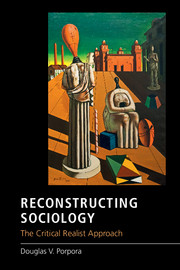Book contents
- Frontmatter
- Dedication
- Contents
- Acknowledgments
- 1 Seven myths of American sociology
- 2 Do realists run regressions?
- 3 What is truth?
- 4 Whatever happened to social structure?
- 5 Are we not men – or, rather, persons?
- 6 What and where is culture?
- 7 Do we need critical realism?
- 8 So what do we do with it?
- Bibliography
- Index
6 - What and where is culture?
Published online by Cambridge University Press: 05 April 2016
- Frontmatter
- Dedication
- Contents
- Acknowledgments
- 1 Seven myths of American sociology
- 2 Do realists run regressions?
- 3 What is truth?
- 4 Whatever happened to social structure?
- 5 Are we not men – or, rather, persons?
- 6 What and where is culture?
- 7 Do we need critical realism?
- 8 So what do we do with it?
- Bibliography
- Index
Summary
Having gone through structure and agency, now, with culture, we come to the C portion of Margaret Archer's SAC. It is Archer's own Culture and Agency: The Place of Culture in Social Theory that represents the major CR statement on this topic, and for Archer, culture needs to be treated in parallel with structure. That parallel means in the first instance to treat culture as something analytically distinct from agency. The two obviously interrelate causally, just as structure and agency interrelate causally. But, again, for two things to interrelate causally, they must be ontologically distinct. It is that ontological distinctness of culture and agency that first marks Archer's CR view.
Of course, for Archer and CR, structure and culture also are distinct. Neither reduces to the other. Whereas structure, as I have said, refers to social organizational relations, for Archer culture refers to intelligibilia.
What does Archer mean by intelligibilia? Intelligibilia are anything with meaningful content produced by social intentionality. That formulation itself requires unpacking. As I made clear in the previous chapter, intentionality and reasoned motivation lie somewhere behind all human action. Action in turn can be social in two respects. It can be motivated or informed by social phenomena – such as rules, myths or ideologies. It can also be socially oriented as is anything designed to communicate to or to otherwise influence others. And, of course, what is social can be both informed by and oriented to what is social.
Because intelligibilia express intentionality, intelligibilia require hermeneutical interpretation to understand or explain. Why do I invoke this clumsy-sounding locution, hermeneutical interpretation? Ironically, for the sake of clarity. In one sense, to understand anything requires interpretation. It requires a kind of interpretation, for example, to discern whether or not in the cosmic background radiation, there is evidence that our universe once inflated astronomically. That kind of interpretation, however, is not the kind we mean when we speak of specifically hermeneutical interpretation.
What is distinctive of the kind of interpretation we mean when we speak of hermeneutical interpretation? The simplest answer is it refers to the distinction the interpretivists or Verstehen sociologists invoke to mark the difference between the natural and the human. Whereas natural phenomena, they say, need to be explained causally, human phenomena need to be understood hermeneutically. Whereas the former involves laws, the latter involves reasons.
- Type
- Chapter
- Information
- Reconstructing SociologyThe Critical Realist Approach, pp. 159 - 187Publisher: Cambridge University PressPrint publication year: 2015



